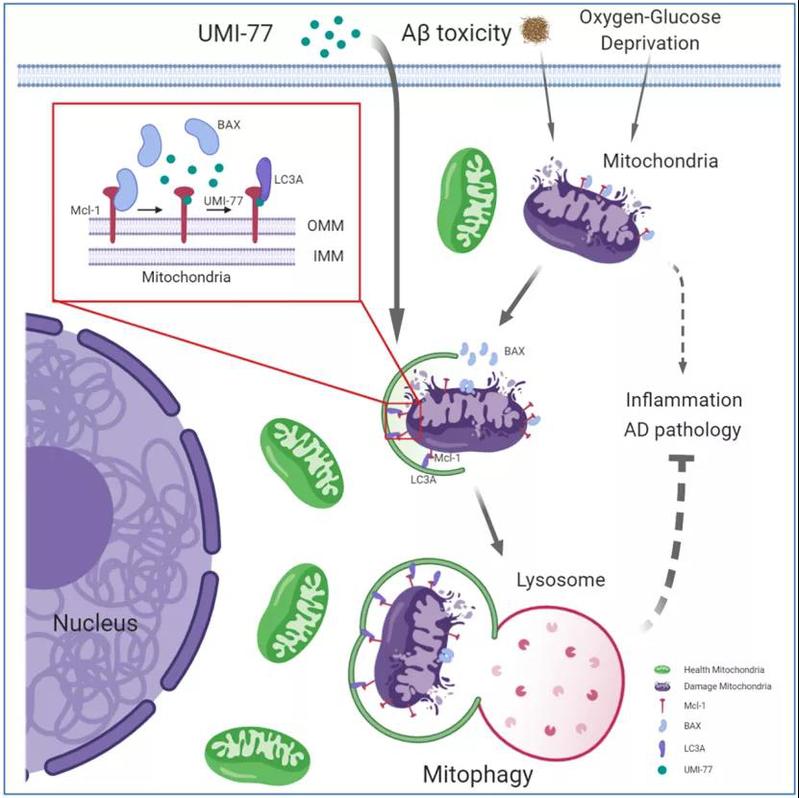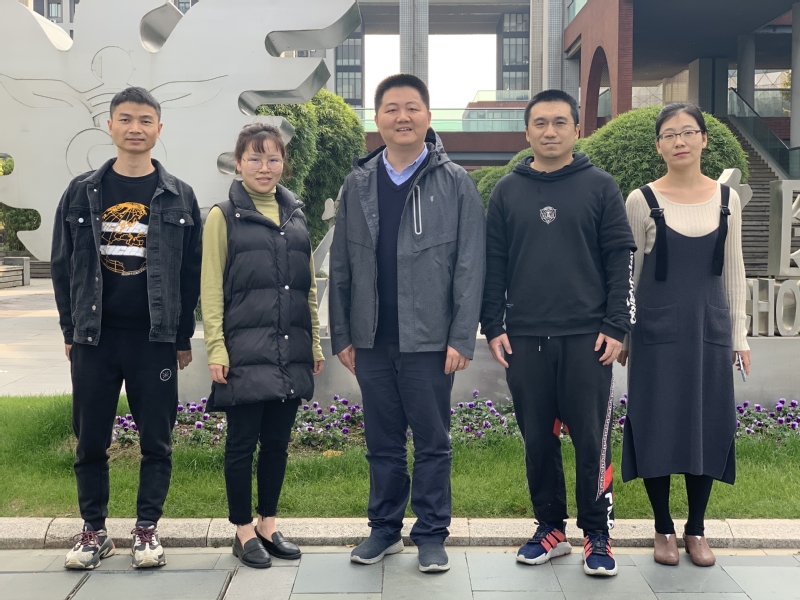November 12, 2020, Nature Communications online published the latest research results of XIA Hongguang's team, Zhejiang University School of Medicine/Liangzhu laboratory: Pharmacological targeting of MCL-1 promotes mitophagy and improves disease pathologies in an Alzheimer’s disease mouse model. It was found that UMI-77, a specific inhibitor of Mcl-1 protein, could significantly alleviate the pathological features of Alzheimer's disease and promote cognitive improvement in mice; explore the new mechanism of mitophagy mediated by Mcl-1 as a mitophagy receptor protein, and propose that targeting Mcl-1 protein to induce mitophagy is a promising strategy for the treatment of Alzheimer's disease.
Alzheimer's disease (AD) is a serious neurodegenerative disease. Patients usually have the symptoms of memory decline and learning ability weakening, accompanied by emotional regulation disorders and loss of motor ability, which greatly affects the development of individuals, families and even society. At present, about 50 million people worldwide suffer from Alzheimer's disease. By 2050, the number is expected to increase to 152 million. At present, the global cost of treating and caring for Alzheimer's disease patients has reached 1 trillion US dollars, and this number will double by 2030.
Xia Hongguang's team has long been engaged in the mechanism research and drug development of selective autophagy in the regulation of major human diseases. Previous studies have shown that a large number of damaged mitochondria exist in brain cells of patients with Alzheimer's disease. Further literature research found that mitochondrial dysfunction is closely related to the occurrence and development of AD. Based on this, they propose a scientific hypothesis that whether the recovery of mitochondrial function can treat AD? Mitophagy is one of the main ways to maintain mitochondrial function and quality control in cells, so they focused on the point of inducing mitophagy.
First, they constructed a sensitive quantitative detection method of mitophagy using the fluorescent protein keima, screened more than 2000 FDA approved drugs or drug candidates, and finally found a small molecule compound UMI-77 that can safely and effectively induce mitophagy. UMI-77 did not cause mitochondrial damage and could selectively degrade damaged mitochondria. UMI-77 did not induce apoptosis of nerve cells, and even significantly inhibited apoptosis at high concentration. This may be due to the fact that UMI-77 cleared the damaged mitochondria, the center of cell death.
Through further study of the mechanism, they found that UMI-77 mediates mitophagy dependent on Mcl-1 protein. Overexpression of Mcl-1 protein can significantly promote mitophagy. They speculated that Mcl-1 may be a new mitophagy receptor protein. They identified LIR motif of Mcl-1 for mitophagy and downstream interaction protein LC3A. They confirmed by point mutation experiments that UMI-77 mediated mitophagy depended on LIR motif rather than the anti-apoptotic function of Mcl-1. Based on this, they proposed an action model of UMI-77: UMI-77 inhibited the interaction between Mcl-1 and Bax, released the free Mcl-1 protein, which interacted with downstream LC3A protein and induced mitophagy. Interestingly, after 2 months of treatment with UMI-77, the Alzheimer's disease model mice showed significant improvement in cognitive learning ability and memory recovery. Subsequent physiological and biochemical experiments in mice also showed that UMI-77 could significantly reduce the level of inflammatory factors in the brain, clear amyloid Aβ deposition, and restore the healthy morphology of neurons and neuronal mitochondria.
This study found that Mcl-1 is a new mitophagy receptor protein; UMI-77 can induce mitophagy by releasing free Mcl-1 protein, and reverse the pathological characteristics of Alzheimer's disease. This study suggests that Mcl-1 is a new drug target for the treatment of Alzheimer's disease, and inducing mitophagy is an effective strategy for the treatment of Alzheimer's disease.
Xufeng Cen, Xiaoyan Xu, Ronghai Wu, postdoctoral fellow of Zhejiang University School of Medicine/Liangzhu laboratory; doctoral student Yanying Chen and Fusheng He, lecturer of Taizhou University, were the co-first authors of the paper. Hongguang Xia, a researcher from Zhejiang University School of Medicine/Liangzhu laboratory, is the main corresponding author.


Please refer to the Article: https://www.nature.com/articles/s41467-020-19547-6